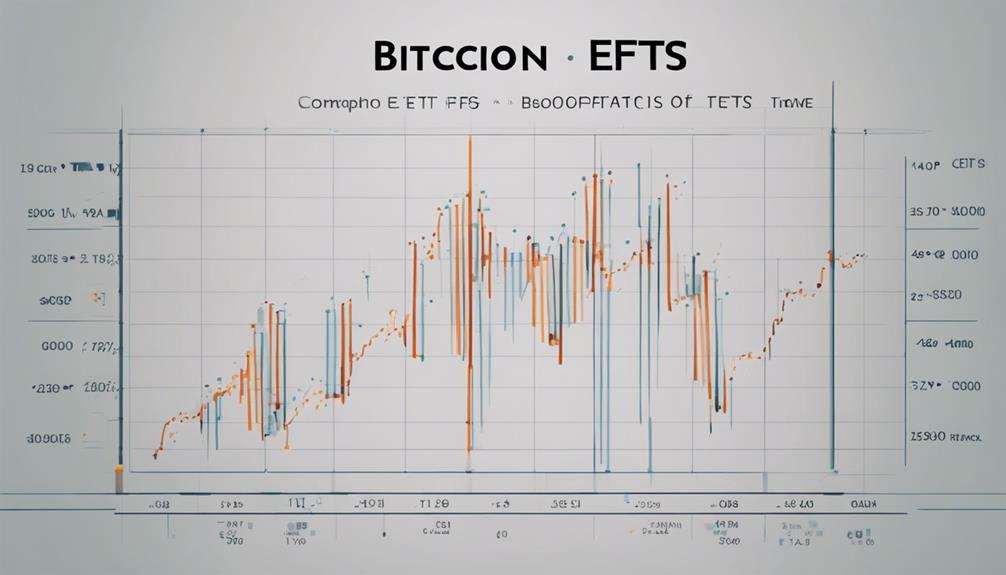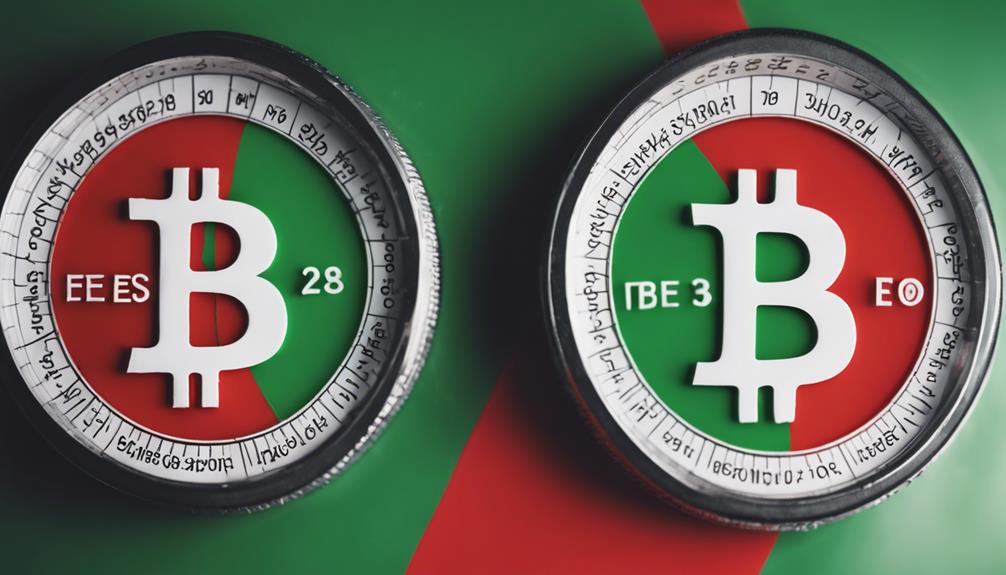Bitcoin IRA
What Is the Best ETF for Bitcoin?
Wondering which ETF is the best for Bitcoin? Explore key factors like expense ratios, performance metrics, and fund size to make an informed decision.

When selecting the best ETF for Bitcoin, consider factors like expense ratios, performance metrics, fund size, fee waivers, and fund manager expertise. Analyze metrics such as return on investment, volatility, risk, trading volume, and year-to-date performance. Compare expense ratios and fees among options like iShares Bitcoin Trust ETF (IBIT), Invesco Galaxy Bitcoin ETF (BTCO), and Bitwise Bitcoin ETF (BITB). Evaluate custodial arrangements, tax implications, liquidity, and trading volumes. Monitor historical returns, volatility, investment strategies, and expert recommendations. Thoughtful assessment of these aspects is essential for well-informed investment decisions in the evolving Bitcoin ETF market landscape.
Key Takeaways
- Consider expense ratio, performance, fund size, and custodial arrangements.
- Evaluate tax implications, liquidity, and trading volumes.
- Compare historical returns, volatility, and investment strategies.
- Expert recommended ETFs include IBIT, FBTC, ARKB, GBTC, and HODL.
- Assess fees, expense ratios, and temporary fee waivers for informed decisions.
Factors to Consider When Choosing

When selecting the best ETF for Bitcoin, we prioritize examining factors like the expense ratio, performance metrics, fund size, fee waivers, and the fund manager's expertise.
The expense ratio plays an important role in determining the overall cost of holding an ETF such as the iShares Bitcoin Trust (IBIT) with a low 0.12% expense ratio, making it an attractive option for cost-conscious investors.
Performance metrics, like the year-to-date performance of funds such as the Fidelity Wise Origin Bitcoin Fund (FBTC) with a remarkable 50.2% YTD performance, provide insights into how well the ETF has been tracking the price of Bitcoin.
Moreover, evaluating the fund size is essential, as larger funds like the ARK 21Shares Bitcoin ETF (ARKB) with $2 billion in Bitcoin holdings may offer increased stability and liquidity.
Additionally, considering fee waivers offered by ETFs like VanEck's Bitcoin Trust can be advantageous, especially during the initial stages of investment until a certain asset threshold is reached.
Lastly, analyzing the expertise and credibility of the fund manager, such as BlackRock managing the iShares Bitcoin Trust, adds another layer of assurance and trust for investors seeking a well-managed Bitcoin ETF.
Performance Metrics and Analysis

When assessing the performance of Bitcoin ETFs, we need to take into account key metrics such as return on investment, volatility, and risk.
These metrics offer crucial insights into how an ETF has performed and the level of uncertainty associated with its returns.
Return on Investment
Comparing the year-to-date performance metrics of various Bitcoin ETFs reveals significant variations in returns.
iShares Bitcoin Trust (IBIT) has shown a remarkable 50.2% return.
Fidelity Wise Origin Bitcoin Fund (FBTC) stands out with a 0% expense ratio and a matching 50.2% year-to-date performance.
ARK 21Shares Bitcoin ETF (ARKB) follows closely with a 50.0% return and a 0.21% expense ratio.
Bitwise Bitcoin ETF Trust (BITB) and VanEck Bitcoin Trust (HODL) both offer competitive year-to-date performances at 49.8%, accompanied by expense ratios of 0.20% and 0.25%, respectively.
These figures provide investors with valuable insights into the returns generated by different Bitcoin Exchange-Traded Funds, aiding in informed investment decisions.
Volatility and Risk
The volatility and risk associated with Bitcoin ETFs can be analyzed through performance metrics and careful analysis of factors such as year-to-date returns and expense ratios.
Examining the YTD performance of various Bitcoin ETFs like iShares Bitcoin Trust (IBIT) at 50.2% with an expense ratio of 0.12%, Fidelity Wise Origin Bitcoin Fund (FBTC) with a 0% expense ratio and the same YTD performance, and ARK 21Shares Bitcoin ETF (ARKB) at 50.0% with an expense ratio of 0.21%, investors can gauge the relative risk and potential returns.
Additionally, factors such as trading volume, assets related to the ETF, and the spot price of Bitcoin play important roles in determining the risk levels of these publicly traded investment products.
It's crucial to take into account these metrics to make informed financial decisions in the highly liquid and volatile cryptocurrency market.
Comparing Expense Ratios and Fees

When comparing expense ratios and fees among different Bitcoin ETFs, it's important to conduct a cost comparison analysis to understand the implications on investment returns.
Evaluating the fee impact of each ETF can provide insights into which option aligns best with our financial goals and risk tolerance.
Cost Comparison Analysis
With varying expense ratios and fees among different Bitcoin ETF options, investors can carefully consider the cost implications before making their investment decisions.
The iShares Bitcoin Trust ETF (IBIT) stands out with a low expense ratio of 0.12% and $8.9 billion in assets under management, offering a reliable choice.
In contrast, the Invesco Galaxy Bitcoin ETF (BTCO) has no expense ratio and $367 million in assets under management, making it a cost-effective option for investors.
The Bitwise Bitcoin ETF (BITB) presents an attractive choice for cost-conscious investors with a 0.00% expense ratio and $1.4 billion in assets under management.
On the other hand, the ProShares Bitcoin Strategy ETF (BITO) provides exposure to bitcoin futures with a 0.95% expense ratio and $2.5 billion in assets under management.
Lastly, the Grayscale Bitcoin Trust (GBTC) offers a different investment option with a higher 1.50% expense ratio but holds $25.7 billion in assets under management.
Fee Impact Assessment
Considering the varying expense ratios and fees of different Bitcoin ETF options provides valuable insights for investors seeking cost-effective opportunities.
The iShares Bitcoin Trust ETF (IBIT) boasts a low expense ratio of 0.12%, making it an attractive choice for those looking to minimize costs.
On the other hand, the Fidelity Wise Origin Bitcoin Fund (FBTC) stands out with a 0% expense ratio, which could be a significant advantage for investors aiming to avoid fees altogether.
Investors considering the ARK 21Shares Bitcoin ETF (ARKB) and the Bitwise Bitcoin ETF Trust (BITB) will encounter expense ratios of 0.21% and 0.20%, respectively.
However, the VanEck Bitcoin Trust (HODL) carries a slightly higher expense ratio of 0.25%, which may influence investors' decisions based on the associated costs.
Evaluating Custodial Arrangements

We systematically evaluate custodial arrangements for Bitcoin ETFs to guarantee the security and integrity of the stored assets. Custodial practices for Bitcoin ETFs involve the secure storage of physical bitcoins, with custodians adhering to stringent security protocols to prevent theft or loss.
Third-party custodians are commonly employed by ETF providers to ensure the safety of investors' assets. Transparency in custodial arrangements is paramount, as it fosters trust among investors in the fund. Regulatory requirements mandate specific custodial practices to safeguard investors' assets and maintain compliance with industry standards.
Understanding Tax Implications

Investors in Bitcoin ETFs should be mindful of the tax implications, especially regarding capital gains and dividends. When selling shares of Bitcoin ETFs, capital gains taxes are typically applicable on any profits made. Holding onto Bitcoin ETFs for over a year may qualify investors for lower long-term capital gains tax rates, depending on their individual tax brackets.
It's important to report any dividends or interest earned from Bitcoin ETFs on your tax returns. Keep in mind that the tax treatment of Bitcoin ETFs can vary based on individual circumstances, such as residency and specific tax laws in your country of residence. For personalized advice on the tax implications of investing in Bitcoin ETFs, it's advisable to consult with a tax professional or accountant. Their expertise can help navigate the complexities of tax laws and ensure proper compliance when dealing with Bitcoin ETF investments.
Liquidity and Trading Volumes

Ensuring adequate liquidity and robust trading volumes is essential when evaluating the performance of an ETF. When it comes to ETFs, liquidity plays an important role in determining how easily they can be bought or sold on the market.
Here are some key points to keep in mind regarding liquidity and trading volumes:
- Higher trading volumes typically indicate more liquidity and greater investor interest in the ETF.
- ETFs with low liquidity may experience wider bid-ask spreads, potentially leading to higher trading costs.
- The levels of liquidity and trading volumes can have a notable impact on the price efficiency and overall performance of the ETF.
- It's important for investors to actively monitor liquidity and trading volumes to make well-informed decisions when trading ETFs.
Historical Returns and Volatility

Monitoring historical returns and volatility is essential when evaluating the performance of Bitcoin ETFs, with recent YTD numbers showcasing impressive growth rates across various funds.
As of now, the iShares Bitcoin Trust (IBIT) has demonstrated a YTD return of approximately 50.2%, indicating strong performance in the market. Similarly, the Fidelity Wise Origin Bitcoin Fund (FBTC) has also posted a YTD return of 50.2%, boasting a competitive edge with its 0% expense ratio.
The ARK 21Shares Bitcoin ETF (ARKB) follows closely behind with a YTD performance of 50.0% and a modest 0.21% expense ratio. Additionally, the Bitwise Bitcoin ETF Trust (BITB) and VanEck Bitcoin Trust (HODL) have recorded YTD performances of 49.8% each, accompanied by expense ratios of 0.20% and 0.25%, respectively.
These figures not only highlight the impressive returns these Bitcoin ETFs have generated but also emphasize the importance of considering expense ratios when making investment decisions in the cryptocurrency market.
Investment Strategy and Objectives

Exploring various investment strategies and objectives is essential when evaluating different Bitcoin ETF options. When considering Bitcoin ETFs, investors must weigh factors such as direct exposure to spot Bitcoin, expense ratios, and specific investment objectives. Here are some key points to keep in mind:
- Direct Exposure: Spot Bitcoin ETFs like iShares Bitcoin Trust (IBIT) and Bitwise Bitcoin ETF (BITB) offer direct exposure to the price movements of Bitcoin.
- Indirect Exposure: Some Bitcoin ETFs provide indirect exposure through futures contracts, mining stocks, or investments in Bitcoin-related assets like blockchain technology companies.
- Investment Objectives: Understanding the investment objectives of each Bitcoin ETF is vital, as some may focus on long-term growth while others target short-term gains or specific sectors within the cryptocurrency market.
- Expense Ratios: Investors should carefully assess the fees and expense ratios associated with each Bitcoin ETF to make sure they align with their overall investment strategy and goals.
Considering these factors can help investors make informed decisions when selecting the most suitable Bitcoin ETF for their investment portfolio.
Expert Recommendations and Insights

After careful evaluation of various Bitcoin ETF options, expert analysis suggests focusing on the top performers with low expense ratios and substantial asset holdings.
The iShares Bitcoin Trust (IBIT) stands out with its low 0.12% expense ratio and significant $8.9 billion in assets under management, making it an attractive choice for investors looking for efficient exposure to Bitcoin.
Fidelity's Wise Origin Bitcoin Fund (FBTC) is another compelling option due to its 0% expense ratio and impressive holding of over 128,000 Bitcoins valued at around $9 billion, offering a cost-effective way to gain exposure to the cryptocurrency market.
For those seeking a competitive expense ratio, the ARK 21Shares Bitcoin ETF (ARKB) with its 0.21% ratio and $2 billion in Bitcoin holdings presents a strong case.
While Grayscale's Bitcoin Trust ETF (GBTC) offers exposure to Bitcoin, its higher 1.5% annual fee may be a consideration for some investors.
Additionally, VanEck's Bitcoin Trust, with its temporary management fee waiver to 0% until March 2025, is an appealing option for those looking to minimize costs while investing in Bitcoin through an ETF.
Frequently Asked Questions
Is It a Good Idea to Invest in Bitcoin Etf?
Investing in a Bitcoin ETF can be a good idea for those seeking exposure to Bitcoin's price movements without directly holding the cryptocurrency. It offers convenience and accessibility through traditional brokerage accounts.
However, factors such as expense ratios, asset under management, and investment strategies should be considered when choosing the best ETF for Bitcoin. It's essential to research and evaluate options to make informed investment decisions that align with your financial goals.
Is There an ETF That Owns Bitcoin?
There are several ETFs that provide exposure to Bitcoin. For instance, iShares Bitcoin Trust (IBIT) directly holds Bitcoin with a significant AUM of $8.9 billion and a low expense ratio of 0.12%.
Invesco Galaxy Bitcoin ETF (BTCO) is another option with $367 million AUM and a 0.00% expense ratio.
Bitwise Bitcoin ETF (BITB) is also popular, holding $1.4 billion AUM with a 0.00% expense ratio, offering direct exposure to Bitcoin.
What Is the Best Way to Invest in Bitcoin?
Investing in Bitcoin can be done through various avenues, such as Bitcoin ETFs. These funds offer a convenient and cost-effective way to trade Bitcoin.
Popular options like:
- iShares Bitcoin Trust (IBIT)
- Fidelity Wise Origin Bitcoin Fund (FBTC)
- ARK 21Shares Bitcoin ETF (ARKB)
- Bitwise Bitcoin ETF Trust (BITB)
- VanEck Bitcoin Trust (HODL)
provide different features and fee structures. Understanding these options is essential to making informed investment decisions.
What Is the ETF Symbol for Bitcoin?
When it comes to finding the right ETF for Bitcoin, understanding the different options available is essential. Each ETF, such as IBIT, FBTC, ARKB, GBTC, and HODL, offers unique features and fee structures.
Analyzing these factors can help us make informed decisions about which ETF aligns best with our investment goals and risk tolerance. By delving into the specifics of each ETF symbol, we can navigate the complexities of the Bitcoin market efficiently.
Is Investing in Bitcoin Through an ETF a Better Option Than Investing in Gold?
When it comes to the bitcoin vs gold comparison, many investors wonder if investing in Bitcoin through an ETF is a better option than investing in Gold. While gold has been a traditional safe haven, Bitcoin ETFs offer the potential for higher returns and diversification in a rapidly changing digital world.
Conclusion
To sum up, after careful consideration of various factors such as performance metrics, expense ratios, and historical returns, it's evident that choosing the best ETF for Bitcoin can be a complex process. It's important to do thorough research and seek expert recommendations to make informed decisions.
Remember, 'don't put all your eggs in one basket' when it comes to investing in cryptocurrencies like Bitcoin. Diversification is key to managing risk and achieving long-term financial goals.
Lawrence founded The Liberty Portfolio to make complex retirement planning accessible to everyone. With extensive experience in investment strategies and financial planning, he leads our strategic direction and ensures that our offerings are aligned with the latest economic trends and regulations. Lawrence’s deep understanding of market dynamics and investment opportunities shapes our platform’s foundational content and tools.
Bitcoin IRA
Signs of a Legitimate Bitcoin IRA Provider
Yearning for a secure future? Discover the essential indicators of a trustworthy Bitcoin IRA provider for sound investment decisions.

When assessing a Bitcoin IRA provider, look for strong industry reputation, clear fee breakdowns, diverse investment options, and regulatory compliance. Confirm they have a proven track record, transparent fee structures, and accreditation. Opt for providers offering a range of investment options beyond Bitcoin, with expertise in digital assets and diversification. Check for adherence to IRS regulations, transparent disclosure of fees, and robust security measures. Positive client reviews, responsive customer service, and professionalism are key indicators of a reliable provider. Prioritize trustworthiness, reliability, and user-friendly platforms. Find out more about signs of a legitimate Bitcoin IRA provider.
Key Takeaways
- Strong industry reputation and compliance with regulatory bodies.
- Transparent fee structure with clear breakdowns.
- Diverse investment options beyond Bitcoin.
- Adherence to legal requirements and IRS regulations.
- Robust security protocols and high client satisfaction.
Industry Reputation and Track Record

When selecting a Bitcoin IRA provider, we prioritize those with a proven track record and strong industry reputation. Managing IRA investments involving crypto assets requires expertise and experience. A provider with a solid track record demonstrates reliability and proficiency in maneuvering the complexities of digital currencies within retirement accounts. Longevity in the industry is also essential; it signifies stability and a deep understanding of the evolving crypto landscape. By choosing a reputable provider, we can entrust our IRA investments in crypto assets to professionals who've a history of success.
Another critical aspect to take into account is regulatory compliance. Ensuring that the Bitcoin IRA provider operates within legal frameworks and meets industry standards is essential for safeguarding our investments. Accreditation adds an extra layer of assurance, indicating that the provider adheres to strict guidelines and best practices. By prioritizing regulatory compliance and accreditation, we can invest in crypto assets through our IRAs with confidence, knowing that our financial interests are protected.
Transparent Fee Structure and Information

When evaluating Bitcoin IRA providers, it's crucial to look for clear fee breakdowns and detailed disclosure of costs. Understanding transaction fees, account maintenance fees, and other charges upfront helps investors make informed decisions.
Transparent providers avoid hidden fees, providing a straightforward overview of all expenses related to managing a Bitcoin IRA.
Clear Fee Breakdown
Legitimate Bitcoin IRA providers present investors with a clear fee breakdown that outlines transaction fees, account maintenance costs, and any other relevant expenses. When evaluating a Bitcoin IRA provider, look for a transparent fee structure that guarantees you're fully aware of the costs involved.
Here are some key aspects to take into account in a clear fee breakdown:
- Detailed transaction fees for buying and selling Bitcoin within the IRA.
- Account maintenance costs to keep your Bitcoin IRA active.
- Any additional charges related to account management or services.
- Transparency in fee disclosure to avoid surprises.
- Understanding the complete cost structure for managing your Bitcoin IRA.
Detailed Disclosure of Costs
A detailed disclosure of costs in a transparent fee structure and information is essential for investors considering a Bitcoin IRA. Legitimate providers offer clarity on fees such as transaction costs and maintenance charges, ensuring investors are well-informed. Transparent fee structures build trust by revealing all expenses linked to managing a Bitcoin IRA.
It's vital for investors to have upfront fee disclosures to prevent surprises and make educated investment choices. Accessible and understandable information on fees allows investors to assess the cost-effectiveness of a Bitcoin IRA provider. Legitimate providers align their fee structures with industry standards and regulations, boosting credibility and trust.
Clear Investment Options

Effective diversification of retirement portfolios hinges on the availability of a diverse range of transparent investment options, including various cryptocurrencies like Bitcoin, Ethereum, and Litecoin. A legitimate Bitcoin IRA provider guarantees clear and varied investment choices to empower clients in building a robust retirement portfolio.
Here are key aspects to ponder when evaluating the investment options offered by a Bitcoin IRA provider:
- Wide Range of Cryptocurrencies: Make sure the provider offers a selection of top digital assets beyond just Bitcoin.
- Transparent Investment Information: Look for clear and easily accessible details about each investment option.
- Expertise in Cryptocurrency Space: Seek a provider that demonstrates knowledge and experience in managing digital assets.
- Commitment to Diversification: Opt for a provider that encourages diversification across different crypto assets.
- Client-Centric Approach: Choose a provider that prioritizes meeting the diverse investment needs of clients.
Registration With Regulatory Bodies

Ensuring regulatory compliance is essential when considering a Bitcoin IRA provider. Verifying their licensing with regulatory bodies like the SEC or CFTC is imperative for investor protection.
This step confirms the provider's transparency and adherence to industry standards.
Regulatory Compliance
In ensuring compliance with financial regulations and investor protection laws, legitimate Bitcoin IRA providers are registered with regulatory bodies like the SEC and the CFTC. This registration signifies a commitment to transparency and adherence to industry standards.
When considering a Bitcoin IRA provider, verifying their registration status with relevant regulatory agencies is vital for investor security. Here are some key points related to regulatory compliance:
- Registration demonstrates accountability and adherence to financial regulations.
- It guarantees investor protection and transparency in operations.
- Compliance with regulatory bodies indicates commitment to best practices.
- Investors should prioritize providers that are registered with the SEC and the CFTC.
- Regulatory oversight helps maintain the integrity of the Bitcoin IRA industry.
Licensing Verification
Legitimate Bitcoin IRA providers demonstrate their commitment to compliance by registering with regulatory bodies such as the SEC or FINRA. Verifying that your IRA custodian is licensed by these reputable organizations is vital for investor protection and regulatory compliance. By confirming the licensing status of a Bitcoin IRA provider through official regulatory websites, investors can mitigate risks associated with unregistered or unlicensed entities. Operating within the oversight of the SEC or FINRA provides a level of assurance and accountability that freedom-seeking individuals value when securing their financial future. Below is a table highlighting the significance of licensing verification:
| Importance of Licensing Verification |
|---|
| Ensures Adherence to Regulations |
| Investor Protection |
| Legitimacy and Credibility Assurance |
| Mitigates Risks Associated with Unregistered Providers |
Compliance With Legal Requirements

Adhering to IRS regulations is a fundamental requirement for reputable Bitcoin IRA providers. Ensuring compliance with legal requirements, including SEC guidelines, is essential for offering cryptocurrency investments within an IRA.
Here are some key points to keep in mind when evaluating a Bitcoin IRA provider:
- Transparent Disclosure of Fees: Legitimate providers openly disclose all fees associated with investing in cryptocurrencies through an IRA.
- Clear Communication of Risks: Reputable companies make sure that clients fully understand the risks involved in cryptocurrency investments within an IRA.
- Tax Implications Awareness: Legitimate providers educate clients on the tax implications of investing in cryptocurrencies through an IRA.
- Industry Standards Adherence: Compliance with industry standards demonstrates a commitment to professionalism and quality service.
- Legal Requirements Fulfillment: Meeting all legal obligations for offering cryptocurrency investments within an IRA showcases a provider's trustworthiness and reliability.
Client Asset Protection Measures

Utilizing advanced encryption technologies and secure offline storage solutions is essential for safeguarding client assets in a Bitcoin IRA. Legitimate providers implement robust security measures to protect client asset information from potential threats. By employing encryption technologies, sensitive data is encoded and secured, reducing the risk of unauthorized access. Additionally, utilizing secure offline storage solutions like cold storage in top-tier facilities enhances client asset protection by minimizing exposure to online vulnerabilities.
These client asset protection measures are designed to prevent hacking attempts and guarantee the safety of funds within a Bitcoin IRA. Reputable providers prioritize the security of client assets, adhering to strict regulatory guidelines to maintain a secure environment. By implementing multi-layer security protocols and encryption technologies, they offer peace of mind to clients, knowing that their investments are safeguarded against potential risks. The combination of secure offline storage solutions and advanced security measures underscores the commitment of legitimate Bitcoin IRA providers to protect client funds.
Security Protocols and Safeguards

We guarantee that our Bitcoin IRA providers exceed expectations in securing your digital assets.
From offline cold storage to multi-encryption encoding, your transactions are fortified with high-quality security measures.
Identity verification procedures are meticulously implemented to safeguard against any unauthorized access.
Secure Storage Measures
Implementing a robust security framework is paramount for legitimate Bitcoin IRA providers when it comes to safeguarding digital assets through secure storage measures. To guarantee the utmost protection, providers employ the following secure storage measures:
- Cold Storage: Digital assets are stored offline to prevent hacking and unauthorized access.
- Multi-encryption Encoding: Utilizing advanced encryption techniques to secure transactions and data.
- End-to-end Insurance Coverage: Providing inclusive insurance to cover potential losses.
- State-of-the-art Security Measures: Implementing cutting-edge technologies to thwart cyber threats.
- Secure Locations: Storing assets in offline locations like nuclear bunkers for added protection.
Encryption Technologies Used
Industry-standard encryption technologies like multi-encryption encoding play a crucial role in guaranteeing the security of digital assets stored by legitimate Bitcoin IRA providers. By using cutting-edge encryption methods, these providers secure transactions and protect client investments. The table below highlights some of the encryption technologies commonly used by reputable Bitcoin IRA providers:
| Encryption Technology | Description | Benefits |
|---|---|---|
| Multi-Encryption | Utilizes multiple encryption layers | Enhanced security for digital assets |
| AES Encryption | Advanced Encryption Standard | Safeguards sensitive financial data |
| SSL/TLS Protocol | Secure Sockets Layer/Transport Layer Security | Ensures secure online transactions |
These encryption technologies work together to maintain the confidentiality and integrity of client information, reflecting the commitment of legitimate Bitcoin IRA providers to robust security measures.
Identity Verification Procedures
Utilizing strict identity verification procedures is essential for ensuring the security of account holders with legitimate Bitcoin IRA providers. These procedures include:
- Multi-factor authentication to add layers of security to accounts.
- KYC (Know Your Customer) verification to confirm the identity of account holders.
- Anti-money laundering checks to prevent illicit financial activities.
- Secure document uploads for safely submitting sensitive information.
- Biometric verification and real-time monitoring for enhanced security measures.
Client Satisfaction and Reviews

Based on online reviews and ratings from platforms like Trustpilot and BBB, we can assess client satisfaction with Bitcoin IRA providers. Positive feedback from clients is important in determining a legitimate provider. Look for comments on customer service, ease of use, security measures, and investment options to gauge satisfaction levels.
High ratings and testimonials from happy customers can confirm the credibility and reputation of a Bitcoin IRA company. Consistent positive feedback and recommendations are strong indicators of a reliable provider in the Bitcoin IRA market. As clients seeking financial freedom, it's vital to take into account the experiences of others before choosing a Bitcoin IRA provider.
Professionalism and Customer Service

Ensuring a high level of professionalism and exceptional customer service sets apart legitimate Bitcoin IRA providers in the industry. When dealing with Bitcoin IRA companies, the quality of customer service can make a significant difference in your overall experience. Here are some key indicators of professionalism and customer service from reputable providers:
- Clear Communication: Legitimate Bitcoin IRA companies maintain professional websites with transparent information on services and fees.
- Responsive Support: They offer customer service through various channels like phone, email, and live chat for timely assistance.
- Knowledgeable Representatives: These providers have well-trained staff who can address inquiries and offer detailed guidance, especially for those new to Bitcoin IRAs.
- Transparency: Legitimate companies are open about their custodian partnerships and security measures, instilling trust in their clients.
- Client-Centric Approach: They prioritize client satisfaction and work diligently to uphold professionalism in all interactions, ensuring a positive customer experience.
Trustworthiness and Reliability

With a myriad of Bitcoin IRA providers in the market, establishing trustworthiness and reliability is paramount for investors seeking to safeguard their digital assets.
When considering a Bitcoin IRA provider, it's important to look for a company that prioritizes security measures and offers insurance coverage to protect your investments. Additionally, make sure that the provider utilizes offline cold storage for digital assets, minimizing the risk of hacking and unauthorized access.
A secure and user-friendly trading platform is also essential for managing investments effectively. Checking customer reviews and the overall reputation of the Bitcoin IRA company can provide valuable insights into its trustworthiness and reliability.
Frequently Asked Questions
Is Bitcoin IRA Legitimate?
Yes, Bitcoin IRA is legitimate. They've been in operation since 2016 and offer a secure platform for cryptocurrency investments. With over 60 types of cryptocurrencies supported, they provide a wide range of options for investors.
Additionally, Bitcoin IRA offers $700 million in insurance protection for digital assets. Their user-friendly setup and trading process, along with offline digital asset storage, make them a reliable and trustworthy choice for investors like us.
How Do You Know if Someone Is Scamming You With Bitcoin?
To avoid Bitcoin scams, we recommend verifying sources and avoiding requests for suspicious actions like downloading apps or transferring funds to unknown wallets.
Legitimate providers won't demand hefty deposits for fund releases or direct you to ATMs for transactions. Stay vigilant for signs like these to protect your assets and financial security.
Trustworthy Bitcoin IRA companies prioritize transparency and secure practices, ensuring your investments are safe and legitimate.
Who Offers Bitcoin Iras?
We can find Bitcoin IRA options from various providers like iTrustCapital, Bitcoin IRA, BitIRA, Equity Trust, and Broad Financial. Each has its own set of features such as diverse cryptocurrency support, insurance protection, secure storage, and self-directed options.
Costs range from percentage-based fees to minimum investment requirements. Researching these providers thoroughly can help individuals choose the best fit for their Bitcoin IRA needs.
How Can You Tell the Difference Between Real and Fake Bitcoins?
When distinguishing between real and fake bitcoins, it's essential to verify transactions on the blockchain ledger.
Real Bitcoins are decentralized digital currencies with encryption and security features, while fake ones lack these safeguards.
Legitimate Bitcoin IRAs comply with IRS regulations and work with reputable custodians, ensuring transparency and security.
Conclusion
In summary, when selecting a Bitcoin IRA provider, it's important to look for signs of legitimacy such as:
- a strong industry reputation,
- transparent fees,
- clear investment options,
- regulatory registration,
- legal compliance,
- robust security measures,
- positive client reviews,
- professionalism, and
- reliability.
By considering these factors, investors can guarantee they're working with a trustworthy and reliable provider for their cryptocurrency retirement savings.
Nancy oversees all content creation at The Liberty Portfolio. Her exceptional skill in translating complex financial concepts into clear, actionable advice makes her an invaluable asset to the team. Under her guidance, our content is informative and engaging, ensuring that readers from all backgrounds can understand and apply our advice. Nancy’s leadership in the content team ensures that our educational materials meet high standards of clarity and accuracy.
Bitcoin IRA
A Step-By-Step Guide to Buying Bitcoin in Your IRA
Uncover the essential steps to purchasing Bitcoin in your IRA for tax advantages and diversification, setting the stage for financial growth and security.

To buy Bitcoin in your IRA, first select a custodian allowing crypto investments. Verify IRS compliance and contribution limits. Choose a platform with low fees and security. Place an order through your custodian, confirm details, and monitor your investment. Understand tax implications and risks. Seek advice for effective financial planning. Bitcoin IRAs offer tax advantages and diversification, yet carry market risks. Securely store Bitcoin within your IRA and acknowledge complexities compared to traditional accounts. Mastering these steps is key to maximizing benefits.
Key Takeaways
- Select an IRA custodian allowing cryptocurrency investments.
- Verify compliance with IRS regulations and contribution limits.
- Choose a reputable platform with secure storage.
- Execute Bitcoin purchase through the custodian.
- Monitor investment performance and adjust strategy.
Setting Up a Self-Directed IRA

When setting up a self-directed IRA for investing in Bitcoin, the first step is selecting a custodian that allows cryptocurrency investments. With a self-directed IRA, individuals have the freedom to choose alternative assets like Bitcoin for their retirement portfolio.
This option provides more control over investment decisions, enabling us to capitalize on the potential of cryptocurrency. However, it's important to ensure compliance with IRS regulations and contribution limits to avoid penalties.
By partnering with a custodian that supports Bitcoin investments, we can navigate the complexities of setting up a self-directed IRA smoothly. Understanding the rules and regulations governing self-directed IRAs is essential to make informed investment choices and maximize our retirement savings.
Funding Your IRA Account

When funding your IRA account, it's important to be aware of contribution limits and choose investment options wisely. Verify that your IRA account allows for cryptocurrency investments like Bitcoin, and make sure the company is licensed to handle such investments.
Understanding the associated fees is essential before investing in Bitcoin through your IRA.
IRA Contribution Limits
For individuals looking to fund their IRA accounts, it's essential to be aware of the contribution limits set for 2021. In this year, the maximum contribution to an IRA is $6,000 for those under 50 years old and $7,000 for individuals 50 and older.
It's important to keep in mind that these contributions must come from earned income like wages, salaries, bonuses, and commissions. When deciding between a Traditional IRA and a Roth IRA, remember that Traditional IRAs offer tax-deferred growth, while Roth IRAs provide tax-free withdrawals during retirement.
Additionally, those aged 50 and above can make catch-up contributions, allowing them to contribute extra funds beyond the standard limits. Understanding these limits can help you make informed decisions about your retirement savings.
Choosing Investment Options
To diversify your IRA portfolio and explore alternative investment opportunities, consider funding your account with Bitcoin. You can choose from various investment options such as contributing directly to your crypto-friendly IRA, transferring funds from existing retirement accounts, or rolling over funds from traditional IRAs or 401(k) plans into a self-directed IRA for Bitcoin investments.
Keep in mind the contribution limits set at $6,000 for individuals under 50 and $7,000 for those over 50 in 2022. Before proceeding, assess the tax implications and fees associated with funding your IRA for Bitcoin investments. Understanding these factors can help you make informed decisions and maximize the benefits of incorporating Bitcoin into your retirement savings strategy.
Choosing a Platform or Provider

Selecting the right platform or provider is vital when maneuvering the process of purchasing Bitcoin in your IRA. When choosing an IRA provider for your cryptocurrency investment, consider factors like fees, security features, and the range of cryptocurrencies available. Look for providers that offer seamless integration with reputable exchanges to facilitate smooth transactions within your retirement account. It's important to confirm that the platform complies with IRS regulations and provides necessary reporting for your Bitcoin investments.
Additionally, check customer reviews and ratings to assess the platform's reliability and customer service quality. Evaluate the track record, user interface, and customer support of the platform to guarantee a hassle-free experience when buying Bitcoin in your IRA. By carefully selecting a platform with strong security features, user-friendly interface, and reliable customer support, you can confidently navigate the world of cryptocurrency within your retirement savings.
Executing the Bitcoin Purchase

When initiating the Bitcoin purchase process within your Bitcoin IRA, proceed by placing an order through the custodian's platform. Confirm the transaction details and review the purchase amount in Bitcoin to guarantee accuracy. Additionally, verify the transaction fees associated with buying Bitcoin within your IRA account to understand the costs involved. It's vital to make sure that the Bitcoin purchased is securely stored within your IRA account to maintain its value and security.
After executing the purchase, monitor your Bitcoin investment within the IRA to track its performance and potential growth. Keeping an eye on the market can help you make informed decisions regarding your investment. By actively monitoring your crypto in a self-directed manner, you can stay informed about any changes in value and adjust your strategy accordingly. Stay vigilant and proactive in managing your Bitcoin IRA to make the most out of your investment.
IRS Guidelines and Regulations

How do IRS guidelines impact the purchase and ownership of Bitcoin within an IRA?
The IRS allows the use of self-directed IRAs to invest in assets like Bitcoin within retirement accounts. Specific regulations govern the buying and holding of Bitcoin in an IRA to guarantee compliance with tax laws. Understanding IRS rules is vital to avoid penalties and maintain the tax advantages associated with IRAs.
Compliance with IRS guidelines is necessary when purchasing Bitcoin in an IRA to safeguard your retirement savings and ensure that your investments align with regulatory standards. By following the IRS regulations regarding self-directed IRAs and Bitcoin investments, individuals can capitalize on the potential growth of cryptocurrency within their retirement accounts while staying within the boundaries of legal and tax compliance.
It's important to stay informed about IRS guidelines to make informed decisions and maximize the benefits of investing in Bitcoin through your IRA.
Consultation With Financial Advisors

When contemplating Bitcoin investments within your IRA, it's important to engage in consultation with financial advisors.
Advisors can offer expertise in selecting suitable investments and aligning them with your financial plan.
Their guidance can guarantee that your retirement portfolio incorporates Bitcoin effectively.
Advisor Expertise Selection
To navigate the complexities of Bitcoin investments in IRAs, selecting a financial advisor with specialized expertise in cryptocurrency is vital. A registered financial advisor can offer valuable insights into how Bitcoin can enhance your retirement savings within a crypto IRA. Expert guidance on portfolio diversification provided by these advisors can help optimize your investments.
Understanding the tax implications and long-term benefits of incorporating Bitcoin into your IRA is essential, and a knowledgeable advisor can assist in this process. Additionally, they can help align your risk tolerance with your investment goals, ensuring that you make informed decisions regarding Bitcoin in your IRA. It's important to choose an advisor who understands the nuances of cryptocurrency investments and can guide you towards maximizing your retirement funds.
Financial Plan Alignment
In discussing financial plan alignment, consulting with financial advisors plays an important role in ensuring that your investment goals are harmonized with your overall financial objectives. Here are four key reasons why consultations with advisors are essential for your Bitcoin IRA and retirement plan:
- Risk Assessment: Advisors help evaluate your risk tolerance, ensuring your investment aligns with your comfort level.
- Tax Efficiency: Understanding tax implications is essential for maximizing the benefits of your IRA.
- Diversification Strategies: Advisors can guide you on diversifying your portfolio effectively with Bitcoin.
- Long-Term Growth: Gain insights into the potential long-term growth of Bitcoin and how it fits into your retirement goals.
Benefits of Bitcoin IRAs

Bitcoin IRAs offer investors tax advantages similar to traditional and Roth IRAs, allowing for tax-deferred or tax-free growth. By including Bitcoin in your IRA investment portfolio, you can diversify from traditional assets like stocks and bonds, potentially enhancing your overall retirement strategy.
This diversification can help spread risk and capture the potential growth that Bitcoin offers as a digital asset. For those with a longer investment horizon and a higher risk tolerance, Bitcoin IRAs can be a valuable addition to their retirement planning.
It's important to trust in the process and understand the complexities involved, ensuring that the Bitcoin IRA provider you choose is reputable and prioritizes security. With proper due diligence, a Bitcoin IRA can offer you the opportunity to invest in the future of finance while benefiting from the tax advantages and potential growth it provides.
Risks of Bitcoin IRAs

Exploring the landscape of Bitcoin IRAs entails understanding and managing the inherent risks associated with market volatility and regulatory uncertainties. When considering Bitcoin IRAs, it's important to be aware of the potential pitfalls to protect your retirement funds effectively.
Here are four key risks to keep in mind:
- Market Volatility: The unpredictable nature of Bitcoin prices can lead to significant fluctuations, impacting the value of your IRA.
- Security Risks: Limited protection for Bitcoin holdings within IRAs exposes investors to potential security breaches and asset loss.
- Taxation of Cryptocurrencies: The uncertain tax treatment of cryptocurrencies in IRAs can add complexity and risk to your investment strategy.
- Fluctuations in Bitcoin Prices: The ever-changing value of Bitcoin can affect the overall worth of your Bitcoin IRA, influencing your retirement savings and financial objectives.
Being informed about these risks is important for making sound decisions when considering Bitcoin IRAs.
Considerations for Opening a Bitcoin IRA

When delving into the domain of retirement planning with cryptocurrency, one must carefully consider key factors before setting out on the journey of opening a Bitcoin IRA. Bitcoin IRAs offer tax advantages similar to traditional and Roth IRAs.
To begin, finding a custodian for your Bitcoin IRA is essential. Aligning your investment goals with the custodian's services is vital to guarantee a smooth experience. Funding methods for a Bitcoin IRA vary and can include cash, checks, or direct deposits.
Once funded, the Bitcoin purchased in a Bitcoin IRA is securely stored within the IRA, offering peace of mind regarding its storage. However, it's essential to acknowledge that Bitcoin IRAs come with additional complexities compared to traditional retirement accounts, so being well-informed and prepared is key to successfully maneuvering this financial avenue.
Frequently Asked Questions
How Do I Buy Bitcoin in My Ira?
To buy Bitcoin in our IRA, we need to open a self-directed IRA with a custodian that allows cryptocurrency investments. Once our IRA is set up, we can fund it through contributions, transfers, or rollovers from existing retirement accounts.
After funding our IRA, we can purchase Bitcoin through the custodian's platform or exchange partner. The purchased Bitcoin will be securely stored within our IRA, offering tax advantages and potential growth within a retirement account.
Can I Buy Bitcoin in a Self-Directed Ira?
Yes, we can buy Bitcoin in a self-directed IRA. It allows for diversifying our investments beyond the usual options.
However, it's important to be aware of IRS regulations and guidelines governing Bitcoin purchases in IRAs. Before diving in, we need to carefully weigh the risks and benefits of holding Bitcoin in a self-directed IRA.
It's all about expanding our financial horizons while maneuvering through the regulatory landscape.
How to Invest in Bitcoin Step by Step?
Investing in Bitcoin step by step involves:
- Finding a reliable IRA custodian,
- Completing necessary forms,
- Funding your account, and
- Purchasing Bitcoin through approved methods.
Once acquired, securely store your Bitcoin within the IRA for potential growth and tax advantages.
Following these steps can help you navigate the process of investing in Bitcoin within your IRA while maximizing its benefits for long-term financial goals.
How to Buy Bitcoins for Dummies?
When it comes to buying bitcoins for dummies, we've got your back!
It's all about finding a user-friendly platform, setting up an account, and making your purchase. Keep it simple and secure.
Remember to do your research, avoid scams, and store your bitcoins safely.
We'll guide you through the process step by step. Let's get started on this exciting journey together!
Conclusion
To sum up, purchasing Bitcoin in your IRA can be a smart investment strategy for the future. By following the steps outlined in this guide, you can navigate the process with confidence and ease.
Just remember, as with any investment, it's important to consult with financial advisors and stay informed on IRS regulations.
So, take the leap and diversify your retirement portfolio with the digital currency that's shaking up the financial world.
Nancy oversees all content creation at The Liberty Portfolio. Her exceptional skill in translating complex financial concepts into clear, actionable advice makes her an invaluable asset to the team. Under her guidance, our content is informative and engaging, ensuring that readers from all backgrounds can understand and apply our advice. Nancy’s leadership in the content team ensures that our educational materials meet high standards of clarity and accuracy.
Bitcoin IRA
The Ultimate Bitcoin IRA Self-Custody Guide
Start your journey to financial security with the ultimate Bitcoin IRA self-custody guide, unlocking secrets to tax-free gains and strategic asset protection.

Explore the key to securing your financial future with the ultimate Bitcoin IRA self-custody guide. Delve into tax advantages, self-custody strategies, risk management, and choosing the right provider. Benefit from tax-free gains, diversify your retirement portfolio, and protect assets with self-custody. Control your private keys, store offline with hardware wallets, and enhance security with multisig setups. Safeguard investments by diversifying, setting stop-loss orders, and embracing long-term strategies. Select the best provider based on fees, available cryptocurrencies, and investment goals. Make informed decisions for financial security and investment potential. Uncover essential insights for maximizing your Bitcoin IRA experience.
Key Takeaways
- Gain control over private keys for security.
- Use hardware wallets for offline storage.
- Implement multisig setups for added security.
- Consider secure storage solutions like safe deposit boxes.
- Self-custody offers control and eliminates third-party risk.
Understanding Bitcoin IRAs

Bitcoin IRAs offer a tax-advantaged way for individuals to invest in bitcoin within their retirement accounts. This setup potentially allows for tax-free gains until withdrawal, providing a unique opportunity for those looking to diversify their investment options within a retirement portfolio.
Unlike traditional IRAs, Bitcoin IRAs involve digital assets like bitcoin, which come with their own set of regulations and custodian processing requirements. One key feature of Bitcoin IRAs is the ability for self-custody, giving investors more control over their assets compared to traditional retirement accounts.
Bitcoin IRA Tax Implications

Considering the tax implications of holding digital assets in an IRA, one must understand how contributions and withdrawals are taxed depending on the type of IRA account.
- Bitcoin IRA contributions are typically made with pre-tax dollars in a Traditional IRA or post-tax dollars in a Roth IRA.
- Withdrawals from a Traditional Bitcoin IRA are taxed as ordinary income, while Roth Bitcoin IRA withdrawals are tax-free if certain conditions are met.
- Bitcoin IRA investments can grow tax-free until withdrawal, providing potential tax advantages over traditional investment accounts.
- Bitcoin IRA owners may face penalties for early withdrawals before the age of 59 1/2, similar to penalties for early withdrawals from traditional IRAs.
- Consult a tax advisor to understand the specific tax implications of holding Bitcoin in an IRA and ensure compliance with IRS regulations.
Understanding these tax implications is important for making informed decisions about managing your Bitcoin IRA to optimize your financial outcomes while avoiding unnecessary penalties and tax burdens.
Self-Custody Strategies for Bitcoin IRAs

When self-custodying a Bitcoin IRA, investors gain control over their private keys and secure their assets, eliminating third-party risk. By holding your Bitcoin in a self-custody setup, you directly manage your digital currency without relying on intermediaries. Utilizing hardware wallets, such as Ledger or Trezor, offers a secure way to store your private keys offline, safeguarding your Bitcoin against online threats.
Multisig setups, where multiple private keys are required to authorize transactions, provide an extra layer of security against single points of failure. Secure storage solutions like safe deposit boxes or secure safes physically protect your hardware wallets from theft or damage. These self-custody strategies not only enhance the security and privacy of your Bitcoin IRA but also reduce the need for third-party custodians, giving you greater independence and control over your retirement funds. Properly educating yourself on these best practices is essential for securely managing your Bitcoin within an IRA.
Managing Risk in Bitcoin IRAs

To effectively safeguard our retirement savings in Bitcoin IRAs, understanding and implementing risk management strategies is paramount. When managing risk in Bitcoin IRAs, we must consider various factors to protect our investments and guarantee long-term financial security. Here are five key practices to help navigate the volatile world of cryptocurrency within your IRA:
- Diversification: Spreading investments across different assets can help reduce overall risk exposure.
- Setting Stop-Loss Orders: These automated sell orders can limit potential losses by selling a cryptocurrency when it reaches a predetermined price.
- Regular Portfolio Reviews: Consistently evaluating and adjusting your portfolio can help ensure it aligns with your risk tolerance and investment goals.
- Monitoring Market Trends and Regulatory Changes: Staying informed about industry developments can inform your investment decisions and help you adapt to changing market conditions.
- Embracing Long-Term Investment Strategies: Patience and a focus on the long haul can help weather short-term market fluctuations and maximize returns over time.
Choosing the Right Bitcoin IRA Provider

In safeguarding our retirement savings in Bitcoin IRAs, the selection of the right provider plays a significant role in ensuring financial security and optimizing investment potential. When choosing the best Bitcoin IRA account, it's important to take into account factors such as fees, types of IRAs, available cryptocurrencies, and investment goals.
Providers like BitcoinIRA offer a wide range of over 60 cryptocurrencies, while BitIRA provides access to 17 without charging any fees. CoinIRA specializes in Roth IRAs and offers 17 cryptocurrencies. iTrustCapital requires a minimum deposit of $1,000 with a 1% transaction fee, whereas Swan Bitcoin has no minimum deposit requirement but charges a 0.99% transaction fee.
Evaluating tax benefits, retirement funds, and reinvestment options provided by different Bitcoin IRA providers is vital for maximizing gains and aligning with your financial goals. Research and compare offerings to find a provider that best suits your needs for a secure and prosperous retirement.
Frequently Asked Questions
Can You Self Custody Bitcoin in an Ira?
Yes, we can self-custody Bitcoin in an IRA. By utilizing a Checkbook Control IRA structure, we directly manage our Bitcoin holdings without custodial approval. Through an LLC owned by the IRA, we gain control, enabling autonomous investment decisions.
This approach enhances security and control over our retirement savings, providing direct access to digital assets. Self-custodying Bitcoin in an IRA empowers individuals to manage their investments independently.
Is Bitcoin IRA Legitimate?
Yes, Bitcoin IRAs are legitimate retirement accounts approved by the IRS. They provide tax advantages similar to traditional IRAs, allowing tax-free growth and potential deductions.
Leading companies like Unchained Capital offer compliant structures for Bitcoin IRAs, ensuring regulatory compliance. Consultation with financial advisors can confirm the legitimacy and benefits of a Bitcoin IRA for retirement planning.
What Is the Minimum Deposit for a Bitcoin Ira?
The minimum deposit for a Bitcoin IRA is $6,000 with Unchained Capital. This requirement guarantees proper diversification and security within the IRA.
It sets a standard for entry into a Bitcoin IRA and signifies a commitment to long-term investment goals.
Meeting this deposit amount is essential to start building a Bitcoin IRA with Unchained Capital.
How Do I Buy Bitcoins With Self-Directed Ira?
To buy bitcoins with a self-directed IRA, we need to select a trusted custodian supporting cryptocurrency investments. Once the IRA is ready, we can purchase bitcoins through an approved crypto exchange.
This allows for potential growth of our investment within a tax-advantaged retirement account. It's essential to follow regulations and choose a reliable custodian to navigate the process smoothly and securely.
Conclusion
To wrap up, self-custody plays a vital role in managing a Bitcoin IRA. Understanding the tax implications and choosing the right provider are essential steps in protecting your investment.
By implementing effective self-custody strategies and managing risk diligently, you can secure your financial future with confidence. Choose wisely, stay informed, and take control of your Bitcoin IRA to maximize its potential for growth and security.
Nancy oversees all content creation at The Liberty Portfolio. Her exceptional skill in translating complex financial concepts into clear, actionable advice makes her an invaluable asset to the team. Under her guidance, our content is informative and engaging, ensuring that readers from all backgrounds can understand and apply our advice. Nancy’s leadership in the content team ensures that our educational materials meet high standards of clarity and accuracy.
-

 IRA Investing3 months ago
IRA Investing3 months agoUnderstanding Your Individual Retirement Account (IRA): Types, Investments, and How It Works
-

 Bitcoin IRA3 months ago
Bitcoin IRA3 months agoBitcoin IRA Gold: Secure Your Retirement Savings
-

 IRA Investing3 months ago
IRA Investing3 months agoHow Are Roth IRAs Invested?
-

 IRA Investing3 months ago
IRA Investing3 months agoIRA Investing Basics
-

 Bitcoin IRA3 months ago
Bitcoin IRA3 months agoEthereum IRA: Invest in Crypto with Your Retirement Fund
-

 Gold IRA3 months ago
Gold IRA3 months agoDiscover the Advantages of a Gold Retirement Account
-

 Bitcoin IRA3 months ago
Bitcoin IRA3 months agoIs Bitcoin IRA Tax Free?
-

 Bitcoin IRA3 months ago
Bitcoin IRA3 months agoUltimate Guide to Crypto IRA Investment Options













